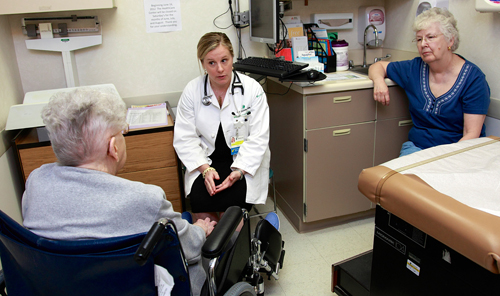Two Christiana Health Care system researchers are furthering their work with funding from a $20 million National Institutes of Health grant awarded earlier this year to Delaware’s ACCEL Program (Accelerating Clinical and Translational Research).
In March, Ursula Guillen, M.D., of Christiana Care Neonatal Associates, received $84,000 for her research into new treatment options for patients with triple negative breast cancer.
Senior Clinical Scientist Jennifer Sims-Mourtada, Ph.D., of the Helen F. Graham Cancer Center & Research Institute, received $89,000 in March, allowing her to conduct a six-hospital study on a decision-making tool intended to help doctors counsel parents facing extremely premature childbirth.
These projects are “excellent examples of what the ACCEL program was intended to do — help transition extensive and groundbreaking research into practical clinical applications,” said William S. Weintraub, M.D., the John H. Ammon Chair of Cardiology and director of the Center for Outcomes Research at the Value Institute, who serves on ACCEL’s executive committee and as the Christiana Care primary investigator.
In May, the ACCEL program held a conference at the Chase Center on the Riverfront in Wilmington that was attended by more than 200 researchers, healthcare professionals and community leaders, including Governor Jack Markell and Congressman John Carney, said Christiana spokeswoman Jennifer Baldino. The conference focused on how to develop research initiatives that will translate from hypothesis to effective treatment and, ultimately, better health care.
A key component of the ACCEL grant is to conduct research that is meaningful to Delawareans. To this end, a great emphasis has been placed on community engagement.
“The ACCEL program is developing groundbreaking research that will translate into practical clinical applications to improve patient care and population health,” said Weintraub. “We are building a data center, which is essential to a strong research infrastructure and we are developing a community network for researcher-community partnerships to identify and conduct research projects that are meaningful.”
In January the NIH announced it will be awarding Delaware’s new ACCEL program $20 million dollars to fuel new medical research in the area. NIH gave $20 million to ACCEL from the its Institutional Development Award or IDeA program, which helps states that are under-represented in NIH funding. The money provides ACCEL with seed funding for new research initiatives in clinical and translational medicine with the goal of putting research into practical use.
Two Christiana Care research pilots backed by $20M NIH grant







